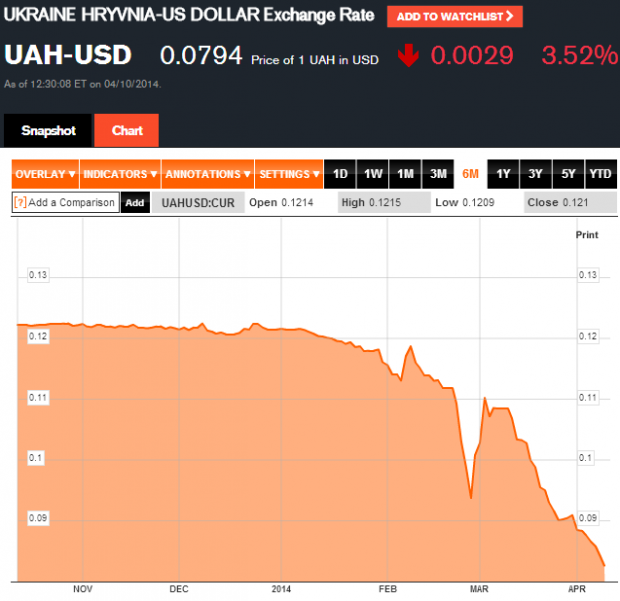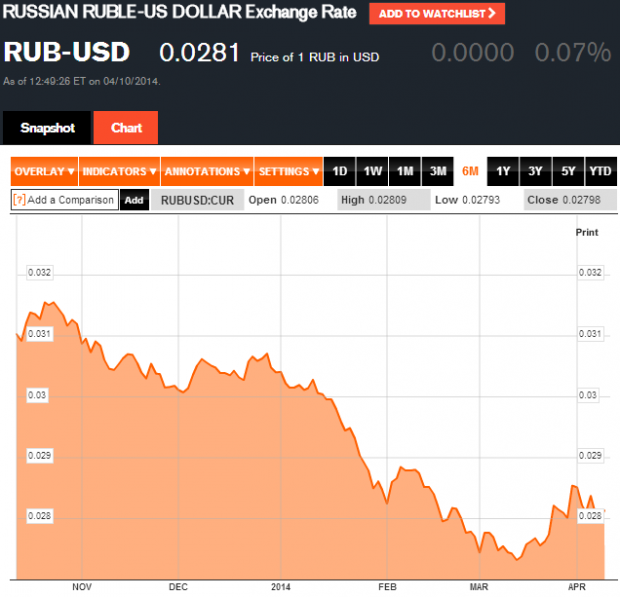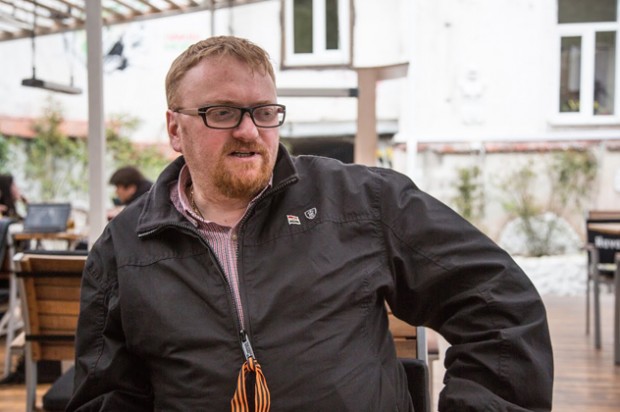With the deadline for separatists to vacate government buildings in eastern Ukraine approaching, the government in Kiev has offered amnesty for the gunmen if they surrender their arms.
Yesterday’s liveblog can be found here. For an overview and analysis of this developing story see our latest podcast.
Please help The Interpreter to continue providing this valuable information service by making a donation towards our costs.
An interactive map of the situation:
View Ukraine: April 9, 2014 in a larger map
Below we will be making regular updates. Be sure to check back often and hit refresh.
1827 GMT: The head of Russian Railways says that rail service between Ukraine and Crimea may be suspended. The stated reason has nothing to do with politics. According to the Russian government daily newspaper Rossiyskaya Gazeta, Russian Railways head Vladimir Yakunin says that the reason for the possible suspension of service is the “inconsistencies in train schedules” as Crimea is now using Moscow’s timezone and is two hours off from Kiev.
Speaking of Yakunin, he is one of the Russian officials who has landed himself on US sanctions list, but despite this fact his children are being investigated for money laundering as they sail through Antigua’s warm waters. See our latest investigation, A Feast in Time of the Plague.
1700 GMT: Bad news for Ukraine’s economy:
Free fall of Hryvnia continues. Official central bank exchange rate is 12.62 UAH per 1 USD, interbank exchange rate is 13.2 UAH per 1 USD
— Myroslava Petsa (@myroslavapetsa) April 10, 2014
A free fall is right. Take a look at the Hryvnia’s value against the dollar since this crisis started (down another 3.52% today):
The ruble was essentially stable today (up .07%), but has still not erased its own loss in value since the crisis in Ukraine began:
Russia’s MICEX index is up 1.39% today, and has been following a zig-zag pattern all week. In general, Russian stocks have been creeping upwards, but have also not replaced their losses over the last few months.
1640 GMT: Russia has been deprived of voting rights within the Parliamentary Assembly of the Council of Europe (PACE). PACE passed the resolution with 145 votes in favor, 21 against, and with 22 abstentions. RFE/RL reports:
All four of the Armenian delegates voted against the resolution as did four of Turkey’s nine delegates. Three of Serbia’s seven delegates also voted against the resolution and three of France’s eight delegates.
Others who voted against the resolution were two Finnish delegates and one member each from the German, Greek, Hungarian, Iceland, and Moldovan delegations.
Russia boycotted the vote, the results of which were clear before the vote was taken. RT.com, the Russian English-language propaganda outlet, has buried the real headline by focusing on Russia’s defiance. Their headline: “Russian delegation leaves PACE session in protest at Ukraine resolution.”
1632 GMT Last night, a fire broke out in the Ukrainian Communist Party headquarters. The fire is already being investigated on suspicion that it may have been arson. RFE/RL reports:
1625 GMT: The 5+2 talks on Transnistrian, a region of Moldova that is under threat internally from a separatist movement and externally by worries that Russia could try to annex it, have been postponed. The United States has issued a statement saying that it regrets this decision:
The United States regrets the postponement of the 5+2 Talks on the Settlement Process on the Transnistrian Conflict, which had been scheduled to take place today and tomorrow in Vienna. We appreciate the efforts of the Chairmanship, its Special Representative, and the Mission to Moldova to move this process forward. We are pleased that the working-level meetings between the sides are continuing, and hope that new dates for the 5+2 Talks can be quickly agreed upon. We also call upon all the parties to avoid taking any unilateral actions that can further disrupt this important process.
Mr. Chairman, the United States calls on the sides not to allow events in the region to affect the settlement talks negatively. The United States reiterates its commitment to working with the other 5+2 partners to find a comprehensive settlement that respects the sovereignty and territorial integrity of Moldova and affords a special status for the Transnistrian region.
As the United States and others have stated, the OSCE Mission to Moldova must have unrestricted access to all of Moldova to perform its activities, including the conduct of observation patrols, in order to provide unbiased reporting on the political and security situation. The restrictions placed on the Mission to Moldova undermine its ability to implement its mandate, and undermine the ability of members of the OSCE to assess the situation on the ground and its potential impact. The United States encourages all those concerned to remove these restrictions and allow the Mission to resume all activities provided for in its mandate.
The word “Ukraine” is absent from the statement, and “unilateral actions” is never defined, but the context is pretty clear.
1608 GMT: Do you really want a window into what Putin and his allies think about this current crisis? We have published an interview with Vitaly Milonov, a leading conservative thinker. As he is considered an ideological leader, some of his statements are highly concerning. Of note in the interview, Milonov’s argument that Russia needs to invade Ukraine on humanitarian grounds, that the Americans were trying to capture the Russian bases in Sevastopol to use them to attack Syria, and his description of Ukrainian acting Interior Minister Arsen Avakov as ”Arsen the Homo.” It’s a long article, but it is today’s must-read: Milonov: “I believe Russia Has a Moral Right to Undertake a Peacekeeping Mission”
1428 GMT: Alec Luhn notes that the separatists who are holding government buildings in Donetsk and Lugansk are very different from each other.
Compare: Donetsk building is held be kids & Cossacks. Luhansk building is held by 43 former elite Berkut shock troops http://t.co/WeHXhRXHZf
— Alec Luhn (@ASLuhn) April 10, 2014
In Lugansk, Luhn interviews a group of well-equipped former members of the infamous Berkut Riot Police who remain defiant:
“I’ll tell you this much: We will fight these faggots,” he said, referring to the new government in Kiev.
As negotiations continued on Wednesday with government representatives, the apparently well-organised group of pro-Russian protesters who call themselves the Army of the Southeast struck a defiant stance after seizing the security service building on Sunday.
Members of the building’s defence who identified themselves as former Berkut (special police) officers from other regions said they would not to fire first but that if attacked they would fight back until Russian forces arrived.
The Kremlin has said it is prepared to intervene as in Crimea to protect ethnic Russians in other parts of Ukraine, and western generals have reported a Russian troop buildup along the border.
The masked commander said the security service building’s defence included him and 42 other former members of the elite Alpha division of the now-disbanded Berkut, who were known as former president Viktor Yanukovich’s shock troops during the Euromaidan protests in Kiev. He said the former president, who fled to Russia in February, had betrayed them.
Will these men, who are trained fighters and say they will fight until Moscow sends reinforcements, even consider Kiev’s offer of amnesty?
1417 GMT: US Secretary of Defense has recently said that the United States could add a combat brigade to Europe, and now, according to a NATO spokesperson, the alliance is debating increasing its forces as well. New options will be discussed at an April 15th meeting. Nayy Times reports:
“He’s looking at a wide range of options and has continued to emphasize that NATO nations should look at how its forces are currently configured in light of the current situation,” Army Col. Martin Downie wrote in an email Wednesday, referring to Air Force Gen. Philip Breedlove, who is also commander of U.S. European Command (EUCOM).
Any decision about increasing the number of US troops in Europe would be made by the Defense Department and National Security Council, said U.S. European Command spokesman Navy Capt. Gregory Hicks.
1409 GMT: NATO General Secretary Anders Fogh Rasmussen said on Thursday that at least 40,000 Russian troops remained in position on Ukraine’s border, and that the troops are a potential invasion force, “not training but ready for combat.”
“From Prague, I have this message to Russia: You have a choice to stop blaming others for your own actions, to stop massing your troops, to stop escalating this crisis and start engaging in a genuine dialogue,” Rasmussen said.
“If Russia is serious about a dialogue, the first step should be to pull back its troops.”
“We have seen the satellite images day after day. Russia is stirring up ethnic tensions in eastern Ukraine and provoking unrest. And Russia is using its military might to dictate that Ukraine should become a federal, neutral state. That is a decision which only Ukraine as a sovereign state can make.”
Russia has responded by saying that NATO’s statements, not its troop movements, are the real provocation driving crisis in eastern Europe:
“The constant accusations against us by the secretary general convince us that the alliance is trying to use the crisis in Ukraine to rally its ranks in the face of an imaginary external threat to NATO members and to strengthen demand for the alliance … in the 21st century,” it said.
1356 GMT: Yesterday Kiev gave the separatists who are holding government buildings in Donetsk and Lugansk a 48 hour deadline to leave. Today, acting President Olexander Turchynov says he will grant amnesty to the separatists:
Mr Turchynov told parliament in the capital Kiev there would be “no criminal prosecution of people who give up their weapons and leave the buildings”.
“I am willing to do this by presidential order,” he said.
Ukraine fears that the Russian separatist actions are a provocation similar to the protests that gripped Crimea days before Russian troops annexed the peninsula last month.
But will the separatists leave? In the last 48 hours, pro-Russian separatists have dug in around the government buildings, particularly in Donetsk where barbed-wire perimeters and large barricades have been erected. If Kiev does not retake the buildings, it’ll encourage more separatists to capture buildings elsewhere. If separatists are killed in the process of taking the buildings, the events could be used as an excuse for Russia to invade.


